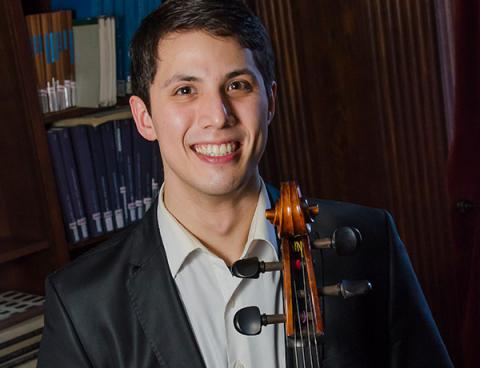Summer Spotlight: Jeremiah-Everard Barcus On Videri String Quartet's High School Composition Intensive Residency

July 19, 2017
Boston, Massachusetts
When you hear the name Videri String Quartet, you almost surely think to yourself, classical music chamber ensemble, right? Well, yes. But also, no. The Boston-based Videri String Quartet is a chamber group that bridges the gap between the classical music world and the rapidly growing realm of video game music.
The group includes myself (cello), Conservatory alumnae Lizzie Jones (M.M. '12, P.S.C. '17, violin) and Roselie Samter (M.M. '09, viola), and Boston University alumnus Michael Hustedde (violin). The quartet is in the process of recording its second full-length album, consisting of half classical music, including Alexander Borodin’s String Quartet No. 2, and half video game music, consisting of Videri String Quartet’s arrangements for a wide array of video games including Journey, BioShock: Infinite, Donkey Kong Country, and Ori and the Blind Forest, to name a few.
Smack dab in the middle of a summer filled with tedious meetings, run-of-the-mill recording sessions, travel (though, who minds a little vacation), and the seemingly unending amount of planning for the next year, we have the unique opportunity to participate in the Boston Conservatory at Berklee High School Composition Intensive (HSCI).
HSCI is a rigorous two-week program led by Boston Conservatory at Berklee faculty that helps young composers write music effectively, learn how to blend genres, and find their own unique voice. The program also allows students to have their compositions performed and recorded by local professional ensembles, and the Videri String Quartet is one of them.
I am thrilled to take part in this program, because back when I was in high school, I had the chance to play in a chamber series in my native Philadelphia playing duos, trios, and quartets with local professionals—and that experience changed my life. I discovered the intense passion and overwhelming joy that comes with playing with people who are truly excellent at what they do, and this is what I hope to bring to the table at HSCI.
We are so excited to work with the composers of the future at HSCI. Our role in the program is beautifully simple: we perform the music written by these aspiring composers. The first few days consist of “reading down” the music—going over the scores with the composers, providing comments, and performing and discussing the music—and extremely brief rehearsals. By the end of the week, we will have performed and recorded each final product, thus giving every participant a strong addition to their college application portfolios.
Chamber music, much like improvisation or acting, relies so heavily on one simple word: yes. The openness of yes—the acceptance of your colleagues and their hard work and support—brings out the best in everyone who participates. Working extensively with Rhonda Rider, chair of the String Department and my cello teacher, and Michael Lewin, piano faculty member and my regular chamber music coach, drove that point home. Both teachers focused so intently on the parts (expressing again and again that one part simply cannot work without the others), while allowing my fellow music-makers and I to paint the picture of the whole. This is one of the most important life lessons I have learned through my time at Boston Conservatory, and one that I hope to pass on to the dedicated participants of HSCI: always do your best and always be prepared, but also trust in your fellow musicians and their instincts—if not, music quickly becomes a lonely business!
